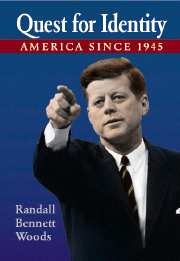Book contents
- Frontmatter
- Contents
- Preface
- 1 The Republic in Transition
- 2 The Origins of the Cold War
- 3 Staying the Course
- 4 Containing Communism and Managing the Military–Industrial Complex
- 5 Capitalism and Conformity
- 6 Liberalism Reborn
- 7 The Wages of Globalism
- 8 The Dividing of America
- 9 Realpolitik or Imperialism? Nixon, Kissinger, and American Foreign Policy
- 10 The Limits of Expediency
- 11 From Confidence to Anxiety
- 12 Governing in a Malaise
- 13 The Culture of Narcissism
- 14 In Search of Balance
- Index
6 - Liberalism Reborn
John F. Kennedy, Lyndon B. Johnson, and the Politics of Activism
Published online by Cambridge University Press: 05 June 2012
- Frontmatter
- Contents
- Preface
- 1 The Republic in Transition
- 2 The Origins of the Cold War
- 3 Staying the Course
- 4 Containing Communism and Managing the Military–Industrial Complex
- 5 Capitalism and Conformity
- 6 Liberalism Reborn
- 7 The Wages of Globalism
- 8 The Dividing of America
- 9 Realpolitik or Imperialism? Nixon, Kissinger, and American Foreign Policy
- 10 The Limits of Expediency
- 11 From Confidence to Anxiety
- 12 Governing in a Malaise
- 13 The Culture of Narcissism
- 14 In Search of Balance
- Index
Summary
As the 1950s drew to a close, a profound malaise seemed to settle over the United States. Dwight Eisenhower had been the ideal president for a nation exhausted by first the Depression, then World War II, and finally the anxieties associated with the Cold War. Toward the close of the 1950s, however, Americans seemed to have decided that eight years of holding the line and clinging to the status quo was enough. A renewed longing for direction and purpose emerged. The launching of Sputnik and the Soviet Union's challenge to American science and technology acted as a catalyst causing politically active Americans to question not only the adequacy of American education, but also the ordering of national priorities.
Liberalism Transformed
The pervasiveness of conservatism and complacency in the immediate postwar era had been due in part to a crisis in American liberalism. Throughout the 1950s liberals – those committed to peaceful change, to social justice at home and abroad – had struggled to reconcile their idealism with the realities of World War II and its aftermath. The evil that lay behind Hitler's death camps and the Armageddon-like implications of Hiroshima left liberals shaken and confused. Many of these same idealists were subsequently disillusioned by the persistence of totalitarianism and aggression in the form of Sino–Soviet communism. Indeed, for many liberals, the corruption of Marxism seemed to threaten idealism itself.
- Type
- Chapter
- Information
- Quest for IdentityAmerica since 1945, pp. 155 - 207Publisher: Cambridge University PressPrint publication year: 2005



